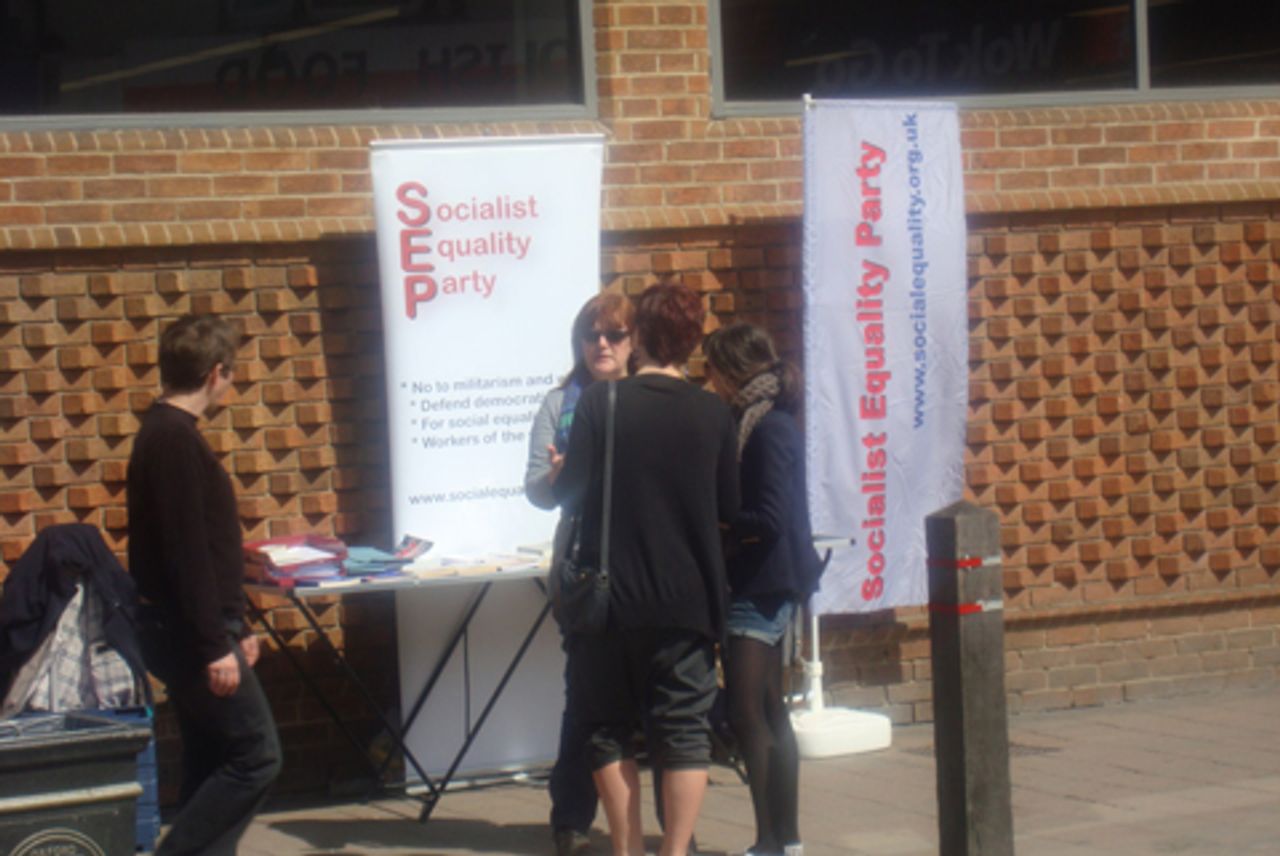 David O’Sullivan
David O’SullivanThe Socialist Equality Party is standing David O’Sullivan in the Oxford East constituency for the May 6 general election.
The constituency is dominated by the university and the BMW Cowley car plant.
Following recent boundary changes, Oxford East now includes the town centre and most of the world famous University of Oxford’s 39 colleges and numerous libraries. The John Radcliffe teaching hospital and the modern Oxford Brookes University are also in the constituency. The total population in the town, which has been an international centre of learning for nearly 1,000 years, is around 143,000 of which 106,000 are in the constituency. Oxford hosts some 30,000 students, a significant number of them from overseas.
Some 17.6 percent of the population was born outside the UK.
The town has a large working class. Along with the university, hospitals and local authority services, major employers include pharmaceutical, engineering, printing and publishing companies and the Oxford Science Park, a collaboration between the university’s Magdalen College and Prudential Insurance.
 SEP campaigning in Oxford
SEP campaigning in OxfordMost famous of all is German-owned BMW’s Cowley car plant. Originally opened in 1913 by Morris Motors, at its peak the plant employed some 20,000 workers in the 1970s. The subsequent destruction of jobs typified the experience of large sections of workers in Britain’s antiquated and failing engineering industries.
Now a mere 3,500 are employed in Cowley. Last year, 850 temporary workers were sacked by BMW, having been given one hour’s notice. A video capturing the immense anger of car workers at the trade union leaders who were announcing the sackings was broadcast round the world on YouTube. (See here for video and report.)
In addition to the densely populated central student areas, scattered student residences and leafy suburbs, the constituency hosts a number of working class estates. Largest of these is Blackbird Leys, which borders on the car plant and for which the plant used to be the major employer.
The current recession has had a broad impact. Unemployment, from a low of 3,666 in 2007, has more than doubled to 8,819 last month, down slightly from a peak of 9,156 in recent months. A job fair in the Town Hall attracted 1,000 people.
A quarter of the city’s population suffers significant financial hardship. The Index of Multiple Deprivation 2007 ranks Oxford 155th out of 354 in the most deprived local authority areas in England. Of 85 areas in Oxford, 10 are among the 20 percent most deprived areas—covering the Leys, Littlemore, Rose Hill and Barton areas of the city.
Oxford has over 9,000 working age residents claiming benefits, the highest percentage in the county. Some 26 percent of under-16-year-olds are living in low-income households. Men and women from the least deprived areas can expect to live five years longer than those in the most deprived areas.
Poverty and a rapidly expanding population, drawn largely to the universities, are placing considerable pressure on housing. Almost 600 households were living in temporary accommodation in May 2007, and many more are sleeping rough.
Prior to the financial crash, house prices in Oxford were high, the average house being sold in 2008 for £295,000. By late 2009, the average asking price had increased to £320,000. Within this increase, however, there are dramatic contrasts. The price of detached villas has fallen from £620,000 to £466,000—down 26 percent—while the price of much smaller terraced houses has gone up by 38 percent from £232,000 to £321,000 over the same period. These figures, beyond the ability of most workers and students to pay, testify to a frantic drive to both downsize and exploit the rental market. Starting prices for a “medium-sized bedroom” are at £330 a month, while £1,200 a month is the asking price for a very ordinary three bedroom semi in nearby Kidlington.
Reflecting the acute housing crisis is the fact that between January and September some 285 families in Oxford defaulted on their mortgage payment. Another 90 are in serious risk of repossession, according to housing charity “Shelter.”
Current job advertisements point to endemic low pay for large sections of workers. A full-time driver/warehouse assistant position offers between £15,000 and £17,500, while first line German speaking IT support workers can expect £10 an hour.
The constituency has been dominated by the Labour Party since 1987, when the current MP, Andrew Smith, beat Conservative Steve Norris. Smith has seen his majority decline rapidly over recent elections. His highest vote was in 1997, with over 27,000. In 2001 it was just under 20,000, while in 2005 it fell further to 15,000, with a 12 percent swing from Labour to the Liberal Democrats. Over the same period, turn out has fallen equally sharply, from 78.9 percent in 1987 to 57.9 percent in 2005.
Smith is retiring this year. The local authority is run by a minority Labour group, which recently reached agreement with the Liberal Democrats to increase council tax payments.
Fill out the form to be contacted by someone from the WSWS in your area about getting involved.
